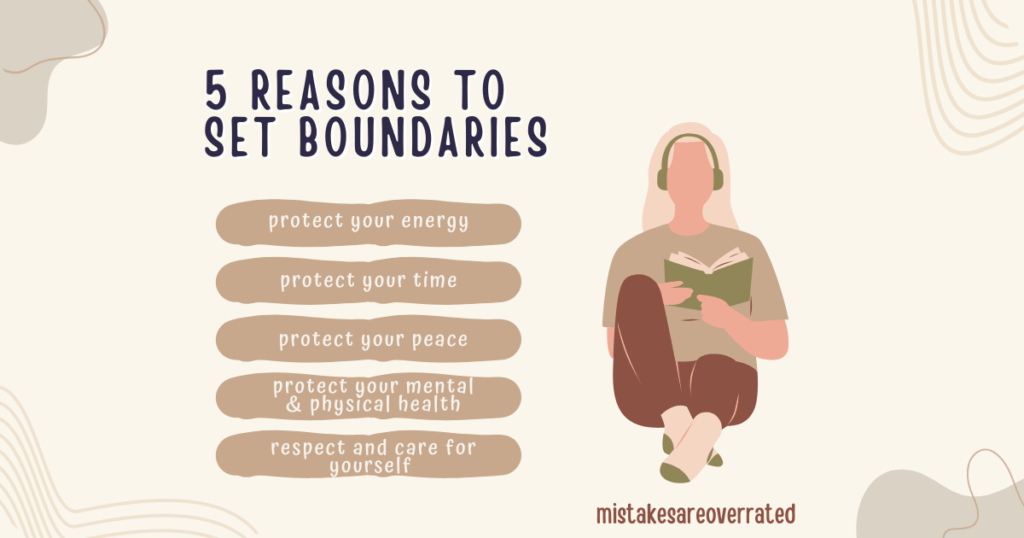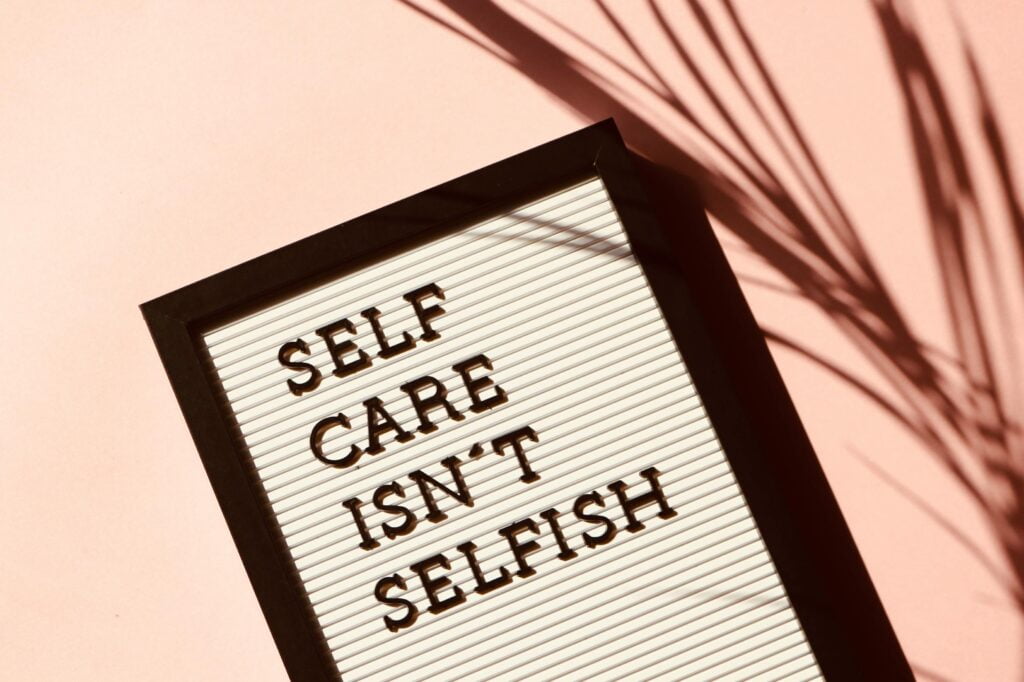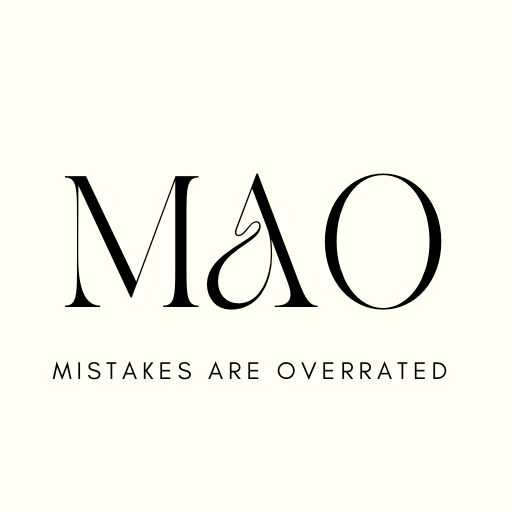boundaries boundaries boundaries. a very popular word now-a-days, yet still a confusing one.
that is why today we will dive into everything boundaries.
types of boundaries
there are 3 main types of boundaries
- a porous boundary
flexible – (too cold)
- a rigid boundary
non-negotiable – (too hot)
- a healthy boundary
healthy and respectable – (justttt right)
a flexible boundary will look like someone who gives in very easily
– peer pressured, influenced, people-pleasing tendencies, bending over backwards for others, ect.
a non-negotiable boundary will look like a boundary someone has set that when i mean set, i mean set in stone.
– limits opportunities in life, pushes the people closest to you away without realising, can become isolating and lonely, ect.
a healthy boundary, as they say, look and are healthy.
– know your wants and needs and able to communicate them clearly and politely.
– prime example of a good give and take, of being able to say “no” yourself, but also being able to accept a “no” from someone else.
boundaries are set physically, emotionally, internally, sexually, spiritually, financially and timely.
boundary
so what exactly is a boundary?
a boundary is a way of protecting your energy, your time and your peace.
most of us, if not all of us, have boundaries of some sort.
around the things we don’t feel comfortable doing, words we won’t tolerate being called, not having the energy for an activity, ect.
if you struggle to set boundaries (don’t worry, it’s very common), you will be happy to hear that it is a skill you can develop.
setting boundaries is a skill in life, and thankfully, skills can be learnt.
the boundaries you set are important to you.
just remember, we have no idea the boundaries others hold until they let us know.
therefore, it is our responsibility to communicate and express our own boundaries.
with that being said, personal boundaries can still well and truly exist without you communicating them.
it just gives them a higher chance of being broken as people aren’t aware of them.
boundaries after trauma
*please note – this doesn’t happen to everyone who has experienced trauma*
in my experience this happened to me, so i want to share it just incase it has happened in your life aswell.
you may have unconsciously set boundaries that were trying to protect you from previous pain or potential triggers.
when i say unconsciously set, i just mean you weren’t aware of these boundaries you set.
you may be thinking “well if i’m not aware i set them, how would i know i have them?“
i’ll quickly explain what happened to me so you can see if it may have happened in your life.
after i went through traumatic event, i unconsciously set rigid boundaries.
i wasn’t aware of these boundaries until i began my healing journey.
i had to dig deep into figuring out – what my boundaries actually were, why i think my body may have set them, what can i do to release the feeling attached to the memory and how can i help heal this boundary.
my body unconsciously set a rigid boundary to try and protect me from feeling that type of pain again.
i was almost a year into my healing journey when i begun learning about boundaries, and only then i realised that this had happened.
so please, no matter what you have been through, believe you have the ability to change – take me for example.
if you want the journal prompts that helped me discover what my boundaries were, please let me know as i am happy to share.
why do we need boundaries
we all need to feel like we belong, we are accepted, and feel like we’re apart of a community.
however at times, we overstep boundaries within ourself just to accomplish these feelings.
this can look like the person who goes out of their way for others, in fear they will lose them or because they feel like they ‘have’ to.
or the person who seeks validation, approval, worth and respect through other people’s words or actions.
if you have a deep desire to change and genuinely want to learn how to set boundaries, this next sentence may be the best motivator for you.
when you willingly overstep a boundary of yours, you are essentially abandoning yourself or losing a part of yourself in a way just to please the other person.
(these can look like people pleasuring tendencies or have a tendency to self sacrifice)
there are many reasons for these tendencies, and i for sure have been there and done them… many times.

how to know when your boundaries are being crossed
an easy way to know if a boundary of yours has been overstepped, is listening and being aware of your emotions and feelings.
when you feel weird, uncomfortable, strange, or you feel like it’s inappropriate.
you musttt communicate your boundaries, as boundaries for you aren’t necessarily someone else’s boundaries.
(don’t worry! – how to communicate your boundaries is explained further down in the article).
how are people meant to know if they are over stepping your boundaries if they don’t even know the boundaries you have set.
boundaries aren’t a universal thing, they are personal from your own experiences, mind and beliefs.
for example; a boundary of mine is an 8 hour sleep. i have communicated this with my friends so they know not to over step it.
well to an extent – they still like to try and push it sometimes when we’re out 😆
how to know if i have boundary issues?
if you feel
- burnt out
- you feel like you’re “used”
- you hold resentment
- are easily irritated or frustrated
- are constantly blaming yourself
- have the urge of wanting to just disappear for awhile – move abroad, long holiday, just stay hidden
the reason many of us don’t like to set boundaries, is mainly because of emotions.
what i mean by this is, simply the thought of setting a boundary can seem terrifying.
in my experience, the boundary itself wasn’t terrifying or scary, it was the thought of having to express my boundary.
expressing my boundary meant i had to open up, and i’m sure it opens many of you up too, to the feelings of fear, vulnerability and even guilt.
most of the time you are actually fearful of their response, not the boundary itself.
read that ^^ sentence again, i really want that to sink in as it took me a while to fully wrap my head around it.
now in the sense of being with others and them asking for you to do something, for a meeting, dinner ect.
sometimes we say yes in the spare of the moment before checking our calendars or, even when we know we have a jam packed week.
the power taking a little break (a pause) in the moment and thinking about what is asked from you is so beneficial.
this way you can reply either in the moment after thinking about it, or tell them you will get back to them.
this is a good habit to get into when you’re first beginning to learn how to set boundaries.
you are probably used to saying “okay”, “yes” or “i don’t mind” when something is asked of you
you will experience the power taking a small break has as you are allowing yourself time to think if you genuinely want to do it or not.
i personally have really been working on setting my assertiveness in the moment and saying “no” in that point in time.
it surprised me that my friends, family and colleagues genuinely don’t mind and in fact respect me more because i am not afraid to say no.
when you set boundaries, you’re giving yourself more time to do the things you love and enjoy the most in your life
you are also giving yourself more time and energy for the people that matter the most to you.
how to identify boundaries
how are you meant to know your boundaries if you don’t even know yourself?
please remember – to figure out your personal boundaries and be able to set them, you have to know yourself first.
feelings/mindfulness – listen and be aware of your feelings and feel them without judgement.
(be present and pay attention to how you’re feeling without the need to make excuses, suppress or change them)
prioritises – figure out what your top priorities in your life are.
(this way you can protect your time and energy so you’re able to do them, or set boundaries to stop procrastinating them).
reflection – reflect on your past experiences. this is how i was able to find the boundaries i had naturally (unconsciously) set.
(discomfort is normal, don’t try to push it away. try your hardest to sit and work through it)
journaling – if above seems too hard or uncomfortable for you to do, then perhaps you will benefits from journaling.
(practise writing your thoughts and feelings each day – i have a full article on how to begin journaling here.)
self care – extremely important to boundary setting. self care is stemmed off of the boundaries you set.
however, a self care boundary may be different to what you’re thinking of.
i’m not talking about getting your eyelashes done once a month, or your once a week spa boundary you must give yourself.
self care boundaries
what i mean by a self care boundary, is;
being able to assert a boundary of yours is an act of self care.
it is as simple as that.
but how so?
you are proving to yourself that you have your back, you’re on your own side and you respect yourself.
you’re caring for yourself in a sense that you’re not going to make yourself do anything you don’t want to.
you’re certainly not going to force yourself into situations where you may feel uncomfortable or anxious in any way.
respect is essentially the willingness you or someone else has, to pay attention and give time, energy and effort to.
i respect my family and friends by not forcing them to be in situations they aren’t comfortable in or putting them through something they don’t want to do.
so why on earth wouldn’t you want to respect yourself!
**if you don’t take care of yourself, how are you meant to take proper care of somebody else? **
to have a self care boundary means you’re protecting your time with a simple but extremely powerful “no”.
by saying “no” to what you don’t want to do or have the time to do, you’re allowing yourself to conserve your energy for the things that matter.
this is very important in helping protect both your physical and mental health.

importance of setting healthy boundaries
- a benefit i have found to setting healthy boundaries is being able to have “guideposts” when it comes to relationships.
the relationships with myself, family, friends, romantic partner, boss and colleagues,
(actually literally any person in your life you talk to when i think about it).
i like to call them guideposts as it helps prevent resentment towards the particular relationships.
if you hold on to the feelings and emotions you experience after a boundary of yours was crossed, you will begin to resent the relationship.
(begin to distance yourself from them because you didn’t want to explain your boundaries to them)
- the respect others had towards me with simply saying “no” when i didn’t feel like something.
also my self respect i built. as i knew i would speak up for myself when a boundary i had set was being tested.
- an empowering benefits i have found from this, is definitely having all of my energy, effort and time when i do say yes to things.
now with the things i genuinely love and want to do, i am 100% present.
i give all of my undivided attention to the person/people/experience i am with and take in the present moment.
my life is now filled with happiness, fulfilment and contentment because i am doing the things i love, for me and when i have time.
*important: the earlier you are able to set the boundaries, the easier it will be for you.
tell people sooner, so they are aware, rather than later, before they might unintentionally cross a boundary.
have trust that once you tell them your boundary, they will respect it.
most people want and desire predictability in life, and setting boundaries helps create predictability with others.
how to communicate your boundaries effectively?
i know that a sentence such as “you have just crossed a boundary of mine” may be very daunting.
so instead, i prefer to use “i” sentences.
huh, what are “i” sentences??
“i” sentences are practised to be able to openly communicate your boundaries without technically openly communicating your boundary.
this is because you are explaining how you feel instead of per se the boundary.
feelings: explain what you’re currently feeling when someone does a certain thing, or how it made you feel if they overstepped a boundary of yours.
you’re able to communicate how you internally feel in response of a certain external influence/stimuli
these can be but not limited to:
- a persons actions or behaviours
- an environment or situation
- a smell, phrase or words said
– anything that may trigger you, or make you feel uncomfortable/unsafe
by using “i” sentences, we are able to take ownership of our own feelings.
it gets better with practising this over and over again.
do so whenever you feel uncomfortable, need to let someone know that they are about to or are currently crossing a boundary of yours.
start off with the “i” sentences until you have practised it enough and feel better doing it.
that way the “i” sentences can transform into “i” statements.
a sentence can be interpreted as either a statement, command or a question.
a statement however, is when you express an opinion or a fact.
with this being said, a statement is more of an assertive way of communicating.
express what you need and how you feel first of all, and then empathise to how they would be feeling.
sometimes communicating a boundary is just as nerve racking or even more, then setting the actual boundary itself in the first place.
how i used to tackle this feeling was as said above, use “i” sentences.
what to expect when you set boundaries
unfortunately, we have to be open with the discomfort.
it will be a very strange feeling at first, as like most new things, because it is strange to start something new – but it does get abit better.
it doesn’t get easier per se, but it does become a little better in a way.
you need to be okay with the uncomfortable feeling you feel when you
– set a boundary.
– the feeling before you express your feelings and/or boundaries
– the feeling you have in the moment of expressing them
– and be open with the discomfort of the consequences/response of others.
my biggest piece of advice on what i wish i learnt sooner at the beginning of my assertive boundary setting journey is this:
the discomfort feeling in this situation is good, it means you’re doing something new for yourself.
but instead of stressing about what someone may say in response, or overthinking what someones response was to you communicating your boundaries, just do this:
feel what you feel in the moment. let the emotion ride out.
do not try to avoid it, push it down when it arises, or make excuses for you feeling this way.
simply just feel. (that right here has done me wonders for my mental clarity!!!!!!!!)
don’t let feelings of guilt, fear, regret, loneliness, embarrassment, rejection, or doubt influence you to not care for yourself.
always protect your energy, time and peace of mind.
* by practising boundary setting, overtime, you will be able to make this your habitual thinking pattern!
unfortunately we are going to get responses from others that may shock us or not be what we expected.
we aren’t always get the response that we want or hoped for, but don’t let that disrupt your inner peace and self care.
in fact, i suggest you actually brace yourself to expect negative reactions and responses.
just remind yourself that you set these boundaries because it is important to you.
please don’t go back on your word for someone else’s benefit, as you will probably begin to slowly resent that person and think “they made me do this”.
in most circumstances, no-one makes you do something, you have a choice.
people can influence us and persuade us, causing us to sway what we do or say, but try not to give in if you’re saying no for your own benefit.
i really hope you have learnt something valuable in this article and it can inspire or help you on your journey.
remember that the longest relationship you will ever have in your life, is the one with yourself.
so please protect, love, appreciate and respect your energy, values, beliefs, time and your overall well-being <3
you are amazing.
don’t give trauma the power to control you, you deserve to live how you want. take control of your trauma.
-life advice from one survivor to another
-MAO
